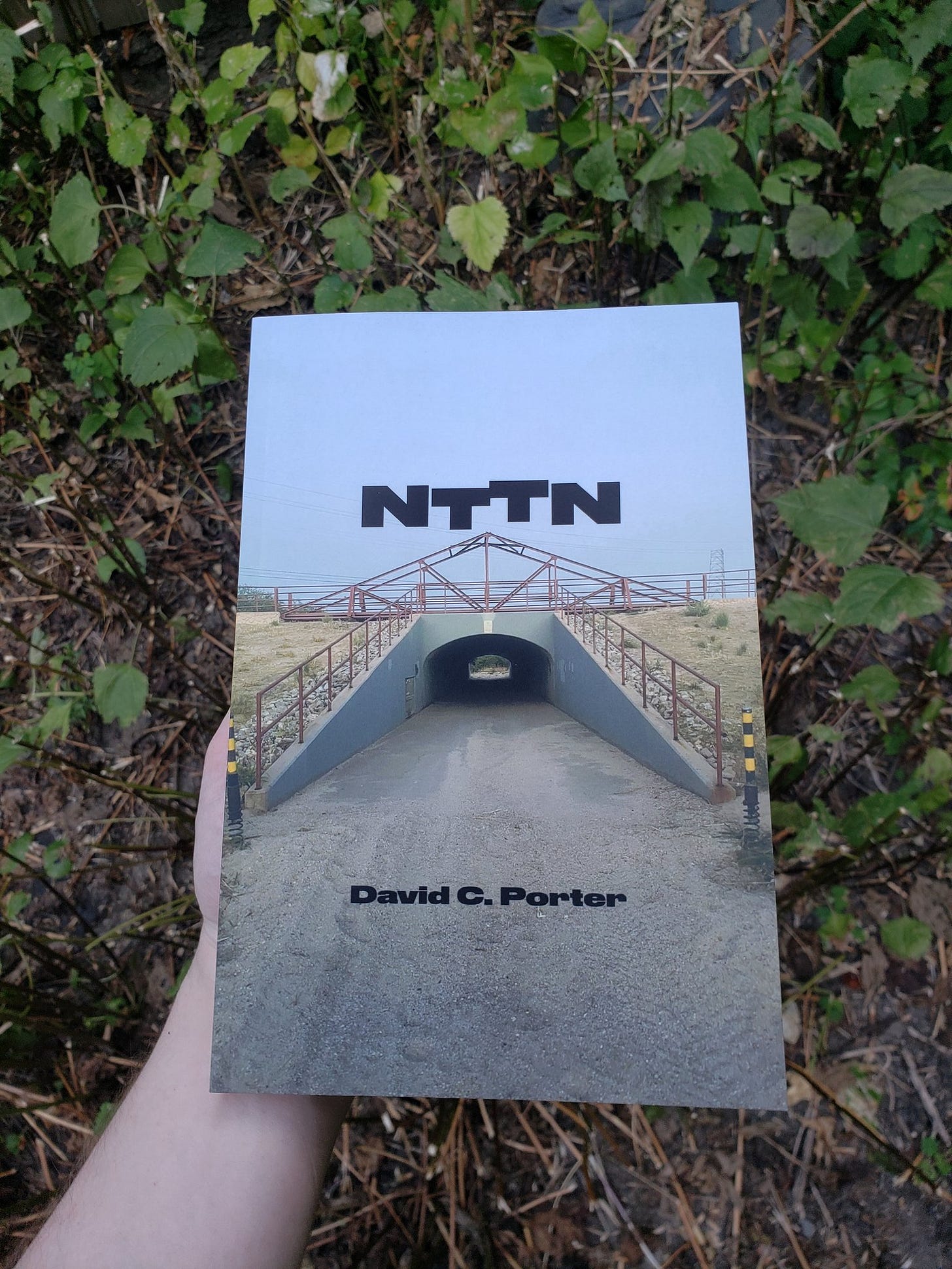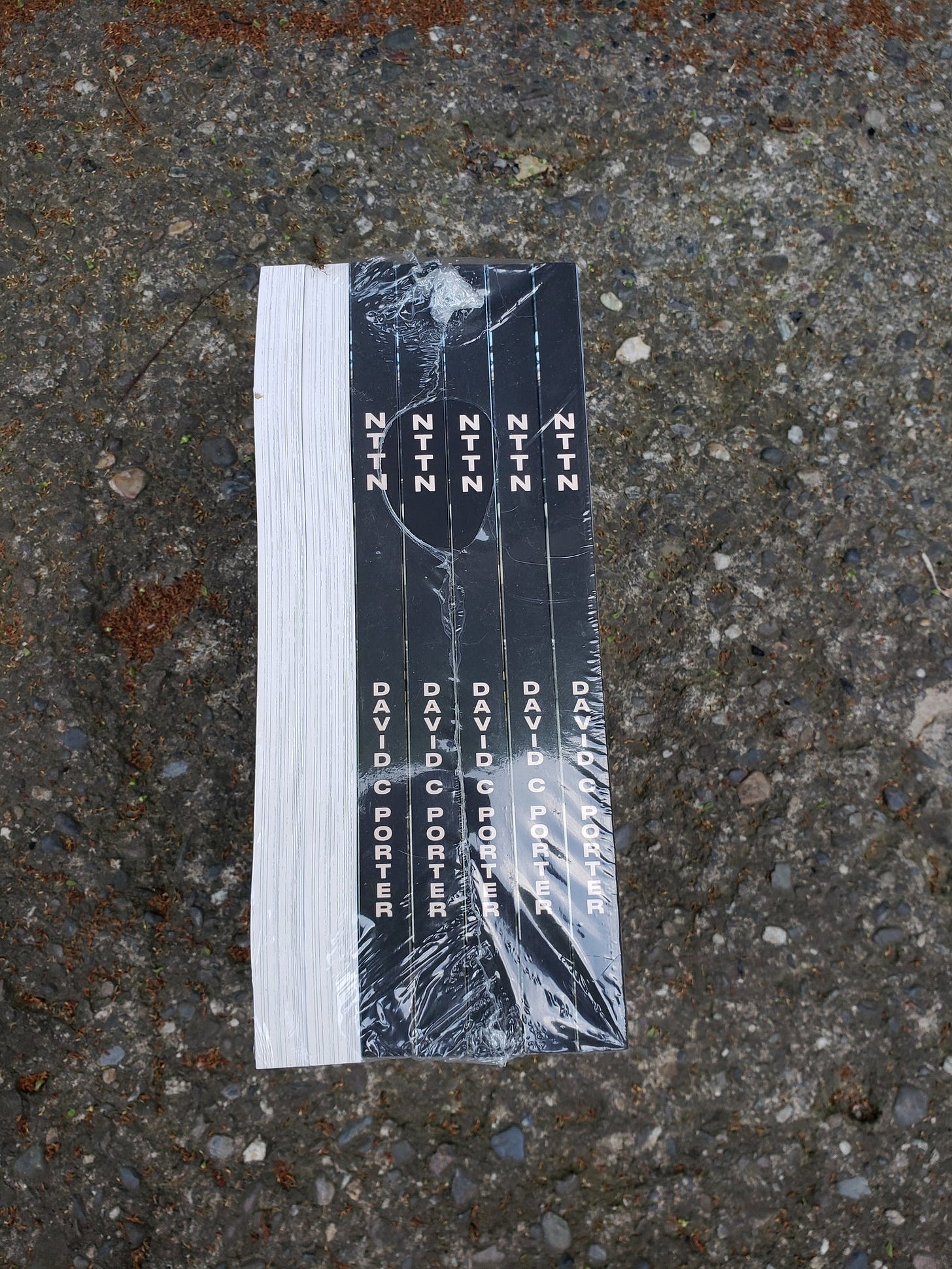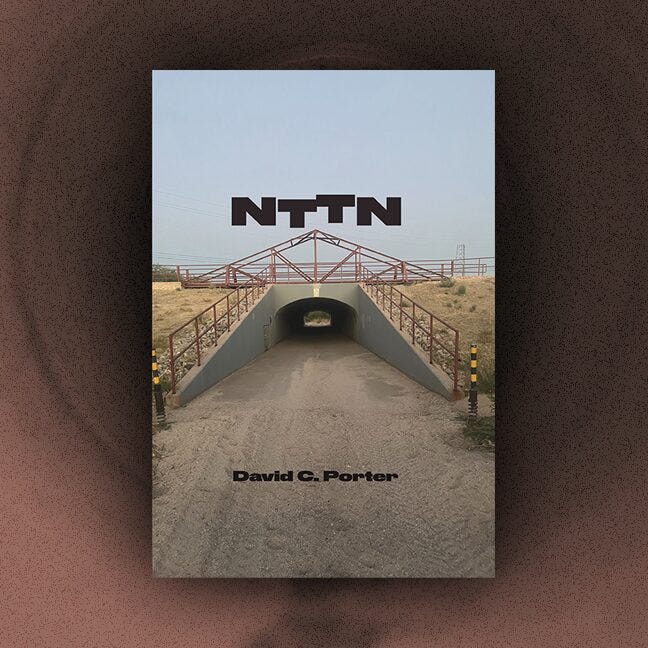On NTTN
A few words on my "debut novel".
“You shouldn’t pay very much attention to anything writers say. They don’t know why they do what they do.” –John Barth
I’ve written a book. The book, which is prose fiction, is called NTTN, and it was just published by Organ Bank Industries. You can buy it here. If that’s all you need to know, there you go. I appreciate your support, and your confidence in my literary capabilities, immensely. If you need a bit more convincing, though, or if you’re simply interested in reading what I have to say about it, well, that’s what the rest of this post is for. I’m sure there will be another link to click near the end.
NTTN is a novel, more or less – I’m don’t really want to call it that because I don’t think it there’s much utility in conceptualizing a writing practice through the categories of the publishing industry anymore (if there ever was any), but I’m not going to play dumb and/or insist on some baroque neologism. Pragmatically speaking, it’s a novel. The way I pitched it, when I was pitching it, was as a “mutilated detective story.” As this might suggest, this means it’s a bit “experimental” (also a term I don’t love, although, unlike “novel”, I do believe there can be utility in it) – there’s an essentially coherent, essentially linear narrative through-line, but it’s subject to a number of procedures and interventions, all intended to disrupt and destabilize. Ultimately, it’s a heavily fractured, fragmented book, an assemblage of big, irregular chunks of plot strung together on thin wires, surrounded by a constellation of smaller prose-objects which exist in an ambiguous relation to them. This fragmentation was in part a tactical decision, a way to make the prospect of writing an entire book, something I had never done before, feel more manageable by breaking it down into a matter of scenes and sequences that would only need to hang together with a limited degree of cohesiveness, but it was equally a matter of form matching content. NTTN, in brief, is about two nameless police detectives investigating a series of homicides which seem to be connected only by the recurrence of a particular symbol at the crime scenes, and who slowly become convinced that a TV station which broadcasts nothing but long, static shots of empty rooms, is, somehow, at the center of the mystery. “NTTN” refers to the call letters of the station. Further, as the detective’s investigation progresses, the society around them is simultaneously undergoing a generalized, accelerating collapse. People form suicide pacts, attack one another on the street, lock themselves up in their rooms, vandalize their businesses – seemingly for no reason at all. Thus the narrative structure: while the detective’s “investigation” is straightforward in the way of following a breadcrumb trail or proceeding through life towards your inevitable death, nothing around them is straightforward at all, none of it really maps onto a causality where A leads to B leads to C, etc. It’s necessarily disjunctive and discontinuous, and so the book must be, as well. To be cohesive it must not cohere entirely. To be coherent it must be somewhat incoherent. The book isn’t set in a specific place or time period, and cell phones are conspicuously absent from the narrative, but in this respect I believe it’s very contemporary. Not be be cliché.
If my own notes are to be trusted, I put the final touches on the final draft of NTTN in February of 2023. Two years and change, I’m aware, isn’t a particularly long interim to have between writing and publication, but it is long enough that I feel, to some extent, a real distance from the text, which makes it feel slightly strange to write about now, like a home you used to live in, but don’t anymore. It’s the product of a different version of myself; many of the decisions made in it are not the ones I would make were I to attempt the same project today. Seeing it finally published has sometimes felt like rediscovering it; I haven’t read the thing straight through since I compiled the file, and already I’ve gotten messages from friends reacting to passages or plot details I have no memory of incorporating. It’s been almost like having someone else describe your own dream back to you, reminding you of details you’d forgotten but which, yes, now that you mention it, that is what happened. It’s an odd feeling, not an unpleasant one, just unfamiliar. For me, it’s a reminder that I don’t really own my work – once it’s out there, it takes on its own shape, its own character, the same as anything else outside our own heads. It’s silly, but there’s a sense in which I feel almost under-qualified to talk about it – I know it as a double-spaced XML document, a Scrivener project file, the daily preoccupation of a past self; when my author copies arrived, a box of printed and bound objects with weight and heft and my name on the cover, I didn’t feel as though I was looking at, was holding in my hands the thing I had written, but something else, something foreign to me, which I was surprised to find myself apparently associated with. These strange objects are beautiful, though, and the association is an honor. Pris and Daphne, the overseers of the Organ Bank, poured a ton of time and energy into making this book a reality, and their unwavering belief in my work has meant a great deal (especially after having had another small press accept the manuscript, jerk me around for a year, and then ultimately back out, citing lack of “resources” – the operation is not prominent enough to name here, in fact I’m not even sure if it’s still active; I’m just mentioning this lest anyone get the wrong idea about why this book took as long as it did to come out). In a literary landscape dominated on the one hand by peddlers of cheap provocations for the perpetually aggrieved, and on the other by peddlers of soothing diversions for the increasingly uneasy bourgeoisie, Organ Bank has been, for me, an oasis of work that actually Gets It, and I’m incredibly proud to be able to publish this book with them.
I think that’s about all I have to say. There are certain authors who can write very insightfully about their own work – while this is a capability certain political commitments lead me to believe I ought to try to develop, I certainly haven’t managed it yet. I write because I seem to be fairly good at it, and because I don’t know what else I would do with my life; why I write what I write is not a question I can answer. If anything, it’s only become less clear to me the longer I’ve kept at it. I’m pretty sure I’m doing it for some reason – beyond that, your guess is as good as mine. Probably better, since your subjectivity won’t be tangled up with the text the way mine is. If, after reading all this, you think you’d like to take a crack at it, once again, you can buy NTTN here (and if you’d like to review it, even just for your blog or whatever, shoot me an email or a Xitter DM and I’ll hook you up). Also, a short story of mine that I wrote while I was working on NTTN, and that covers some of the same ground, went up in Organ Bank’s “Oubliette” yesterday – you can read that here. I’d encourage you to take a look at some of the other stuff on the site while you’re there, too.





Congratulations! I just published my first book too, and your description of the uncanny disconnect (the relationship between the person you were when you wrote the book and the person finally holding it) is perfect! I'd like to grab a copy!
🖤🕳️🖤